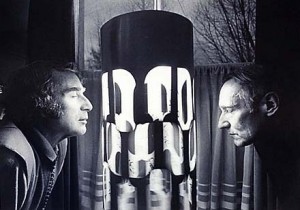It’s time for the third entry in your audio portfolio, folks. For this one, we’ll change gears a bit, toward researching the cultural history of sound reproduction.
Aims of the Exercise
For you to:
- Start researching a particular issue in the history of sound reproduction.
- Use audio to compile sound clips and thoughts that you can later include in an audio documentary (i.e., prompt #5).
- Begin considering yourself a “curator” of recorded sounds, or someone who is responsible for future interpretations of history.
- Gain additional experience in developing narratives and arguments through audio.
Constraints for Audio
- Minimum five found audio clips plus your voice
- Between three and five minutes long
- One text title (for your blog entry), but no other text (see details below)
- Editing: whatever you wish
- Due: Thursday, November 4th
Steps
(1) Determine a cultural aspect of sound reproduction that interests you. Voice-over? Music? Field recordings? Radio? DJ culture? Advertising? Appropriation? Ocularcentrism? The audiovisual litany? The intersections of identities (e.g., race, gender, sexuality, or class) with audio? Audio and community formation?
If you are not sure, then you might want to skip to step 3 below and then refine steps 1 and 2.
(2) Now narrow that focus down to a particular storage medium or two. The phonograph cylinder or disc? Magnetic wire or tape? The MP3? Vinyl records? The phonautogram? You don’t need to focus on only one. You might transition across them, as we did during our turntablism case study (from vinyl to the MP3). Narrowing your focus will not only refine the scope of your research; it will also remind you of the relevance of media to your inquiry.
(3) Start researching! As you do, remind yourself of that question we asked last week: “How is this technology (as an operation and/or an ideology) rendered invisible?” For example, consider our discussion of invisible storytellers, whose voices we can hear, but whose bodies remain unseen. Or our chat about the iPod, which is advertised as intuitive, “hot,” and natural, but is subject to glitches, jailbreaking, and proprietary software. Or our viewing of DJ Shadow’s commentary on “digging,” where—perhaps unlike Girl Talk’s seemingly immaterial treatment of sound—he’s intimately involved (in a basement filled with stacks of history) with the recordings that preceded him.
Please find at least five audio clips to include in your audio piece. The balance can be your voice, if you wish.
Need material? Ideas? Here are some resources to get you started:
For audio:
The Internet Archive (recorded sound)
UbuWeb (recorded sound and avant-garde art)
PennSound (recorded sound and poetry)
American Memory Collections (Library of Congress collection of recorded sounds)
Cylinder Preservation Museum (UCSB collection of cylinder recordings)
The Matrix List of Audio Archives (compiled by folks at Michigan State University)
Your nearby record store, thrift store, eBay, or the like!
Field recordings work, too!
Your own collection, of course!
For ideas and existing research:
Project Muse (UW Net ID required)
JSTOR (UW Net ID required)
Relevant books: The Audible Past (Sterne), Perfecting Sound Forever (Milner), Always Already New (Gitelman), The Auditory Culture Reader (Bull and Back), Hearing Cultures (Erlmann), and America on Record (Millard)
And this list that I compiled back in the day
(4) Now compose your own audio piece that includes the audio clips you found and your initial thoughts. Consider this exercise a “thought piece.” It should be between three and five minutes in duration. In it, you should use your found clips as evidence while also speaking to the peers in your cluster and giving them a tangible sense of:
(a) What you learned about your issue and your medium/media (please use quotes from articles and concrete references to specific artifacts and issues),
(b) What questions (historical, political, and/or aesthetic) are emerging,
(c) What concerns you have about representing (or speaking for / about) the material you found,
(d) What else you need to know (about your material) before you make your documentary (later in the course, for prompt 5), and
(e) How they (i.e., your peers) can help you (e.g., ask them for particular information, ideas, critiques, or suggestions).
Your audio piece must include all five of these gestures. If not, then it will be considered incomplete.
(5) Give your audio piece a title, which will also be the title of your blog entry and should include your issue and your storage medium/media (e.g., “DJs, Digging, and the MP3”).
(6) Save, export as an MP3, and upload it to the blog. Please categorize it under “found sound.”
Outcomes
(1) “Found Sound” is ultimately step one in your research process for the audio documentary. It should demonstrate that you’ve actually researched a particular issue and a specific medium. The thoughts in your audio piece should not be vague or abstract. (Be a historian, not a hipster.) They should be based on the audio and other forms of evidence you discovered.
(2) “Found Sound” is also a thought piece. That said, it should embrace evidence-based speculation and curiosity. No need for an argument just yet. Be honest about what you’ve learned, what you want to learn, and how your peers can help you.
(3) Your audience is your cluster. Your audio should be specifically addressed to them. Feel free to use names and references that perhaps only those in the group will understand.
Schedule
Your audiography is due on our audio blog by the start of class on Thursday, November 4th. The blog entry should include both a title for your audio piece and your playable MP3.  That’s it. Please categorize it under “found sound.†One of your peers will compose his or her own audio in response to what you submit. I will not directly respond to it.






